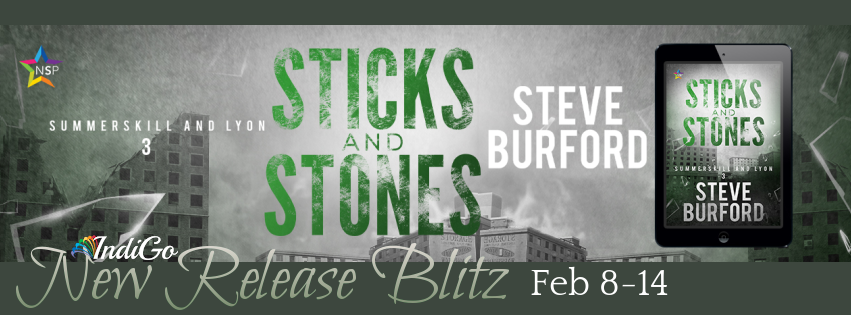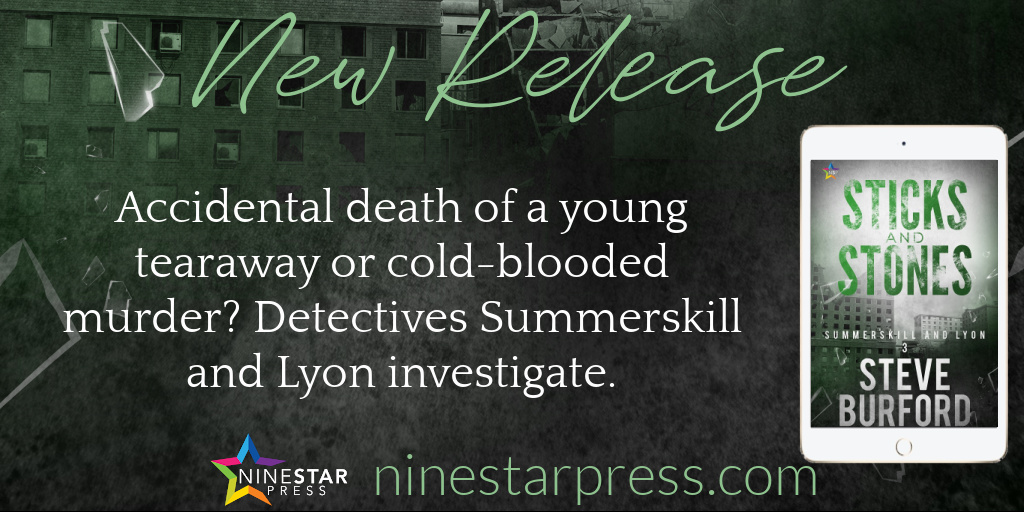
Title: Sticks and Stones
Series: Summerskill and Lyon, Book Three
Author: Steve Burford
Publisher: NineStar Press
Release Date: 02/08/2021
Length: 69600
Genre: Contemporary Police Procedural, LGBTQIA+, Contemporary, crime/thriller, family-drama, murder, drug dealer, school, politician
Add to Goodreads

Description
“He’s a thug… a really nasty piece of work.”
When young Clayton Kerry, member of a notorious Worcester family, is found dead on an abandoned factory site, it looks like an accident. Some even say it was what he deserved. But headteacher Alun Blake’s refusal to sugarcoat the truth about the pupil he excluded causes outrage in the local community and sparks a vendetta against him that rapidly spirals out of control threatening both his life and that of his daughter.
When Detective Inspector Summerskill and Detective Sergeant Lyon investigate, they find Clayton’s death was by no means as clear cut as it had seemed and that they are at the start of a trail that will take them into the heart of a school and far beyond the boundaries of their city, to crime on a national scale.
As they uncover what really happened, Summerskill and Lyon are brought face-to-face with uncomfortable truths about their own lives and relationships. Personal loyalties are tested, and before the case is through, at least one more person will die.
Sticks and Stones is the third in the Summerskill and Lyon series of police procedural novels.
“You’re late.”
“And you’re old. But tomorrow I’ll be on time.”
From behind his desk, DI Rudge grunted. “With age comes wisdom, girly.”
“And arthritis. And Alzheimer’s. And gout. And…”
“I suppose you think you’ve got a good reason to be waltzing in at this time of the afternoon?”
Claire threw her coat over the back of her chair in the office she shared with her former boss and their sergeants. “The school run from hell.”
Rudge grunted again. It was his default form of communication. “Mob of angry villagers baying for blood at the school gates?”
Rudge was a good detective, but this seemed positively supernatural.
“Kind of. How’d you know?”
Rudge jerked a thumb over his shoulder at the tiny room the station laughingly referred to as its Video Lounge. “You’re a daytime TV star.”
Claire signalled to Dave who had followed her in. “C’mon you.”
“I thought we were going to be starting with the kid’s dad. Desk sergeant says they’ve taken him to Interview Three.”
“I reckon you ought to check out the news first,” Rudge said, adding without looking up from his paperwork, “always good to know what you’re letting yourself in for.”
The two of them left Rudge to his admin and third coffee of the day—he’d have been in for over an hour by then—and crossed the corridor to the Video Lounge. From within came the sound of voices and, unexpectedly, laughter. A female voice was saying, “And if you freeze it there, it looks like she’s just sat on something.”
Claire pushed the door open and strode in. “Cracking cases or downloading porn?”
DS Cortez had the grace to look slightly embarrassed. WPC Jenny Trent had no such inhibitions. “Morning, Claire. Day got off to a flying start I see.”
Puzzled, Summerskill and Lyon looked past their colleagues to the screen. At that moment, it was a paused head and shoulders shot of Claire, and the expression did indeed look like she had just sat on something extremely uncomfortable. “Did I really look like that?”
“Not all the time,” Dave said.
“Local telly news,” Jenny explained.
“Shit, that Moody’s quick.”
“Well, this does have to be the most exciting thing that’s happened of a morning for weeks,” Jenny said. “When you consider the second most exciting thing was a suspected outbreak of foot-and-mouth in Hereford you can see why they’d rush it out. They’ll be showing this on the hour every hour for the rest of the day.” She handed the remote to Claire. “I’ve recorded it for you, though, just in case. Enjoy,” and she and Cortez left the room, their laughter only slightly muffled by the door closing behind them.
“Popcorn?” Dave asked as he sat down in the seat nearest the screen.
Claire scowled, rewound the clip to its start, and remained standing as she pressed play. An establishing shot of the front doors of Monastery Grove panned across to one of Sarah Moody speaking directly to camera.
“Last night we reported on the sad news of the death of local schoolboy Clayton Kerry, a pupil here at Monastery Grove High School in the heart of the city. Almost immediately, however, that tragic event was overshadowed by the social media storm that broke out in response to remarks made by Mr. Alun Blake, headteacher of the school where Clayton had been a pupil for over four years.”
The picture changed to show an interior scene, an office in which Alun Blake was sitting at a desk much larger and neater than any desk Claire was used to at Foregate Street. At the bottom of the screen a caption came up giving his name and position. “We were very sad to hear of the death of Clayton Kerry,” Blake said. “It is always a tragedy when a young life is cut short before it has the chance to realise its full potential.”
Cut to a shot of Moody, eyes furrowed in concern. “And how are you feeling right now?”
“Jesus! Has she only got the one question?”
The question might have been lazy, but the response wasn’t what Claire had expected. She’d been braced for the sort of bland expression of sadness and dismay Dave had earlier identified as appropriate. Instead, Blake’s lips thinned again in that expression of near distaste she’d seen less than an hour previously when he was dealing with Moody for a second time on the steps of his school. “It’s very sad,” he said again.
The screen cut back to Moody’s face, her eyes narrowing as if she was focusing on something that needed teasing out.
“They’re called noddies, y’know,” Dave whispered.
“What?”
“These shots of the reporters responding to interviewees. They’re often shot after the interviews have taken place and then intercut.”
Well, that would explain the air of artificiality Claire sensed about this piece. Or maybe that came simply from the dislike she was feeling for the interviewer.
“Was Clayton a good pupil?” Moody was asking.
“What’s that got to do with anything?” Claire demanded.
“I didn’t teach the boy myself,” Blake replied, “but I speak on behalf of those teachers here who did who are all very saddened by this news.”
“But as the headteacher you must have been aware of what kind of pupil Clayton was.”
Claire frowned. “Why is she making such a song and dance of this? She’s got the head saying how sad it was. Job done, move on.”
Dave shook his head. “But he’s not done the full job, has he? Not said what an angel Clayton was, how he was full of fun, kind, loved by all, etc., etc.”
Claire recalled what Tony had told her last night. “That could possibly be difficult.”
By now, the camera had moved in so closely Blake’s face was practically filling the screen. “And why’re they doing that? That’s the sort of shot they use in documentaries on serial killers. Get up that close and you could make my old mam look psychotic.”
Blake was now obviously weighing his words. “Clayton was…a challenging young boy,” he said. “He came from…a difficult home background. We had worked closely with him and his parents to help him make the most of his opportunities during his time with us.”
The camera remained fixed on Blake’s face, Sarah Moody’s insistent questioning coming from somewhere out of shot. “But you had recently expelled Clayton, hadn’t you?”
“The term usually used these days is ‘excluded’,” he replied stiffly, “but yes, Clayton had been excluded.”
“Permanently?”
“Subject to the usual procedures, including any appeals from the family, and after a meeting of the Governors. But yes, Clayton’s exclusion would almost certainly have become permanent.”
“But,” Moody pressed on, “it would be fair to say, wouldn’t it, that if he hadn’t been ‘excluded’, he would have been in school and so this tragic accident could not have occurred?”
Blake looked directly into the camera as he replied. “The school cannot be held responsible for anything that happens to its pupils when they are not on our premises or under our direct care.”
“But he wasn’t on your premises, was he, Mr. Blake, or under your care because you had refused to teach him? As a headteacher, are you aware of a recent government report which said that one of the major contributory factors to teenagers becoming involved in crime is exclusion, either temporary or most especially permanent, from schools?”
For a second, Claire thought she saw something at the corner of one of Blake’s eyes, a tic or brief tightening. Blake’s voice, though, when he spoke was commendably calm and level. “I don’t think that is really an appropriate direction to pursue at this moment in time, do you? All I will say now, once again, is that our thoughts and prayers are with Clayton’s family. Thank you.”
The clip ended and the screen returned to its menu. Claire threw the remote on to the table in disgust. “Talk about hatchet job.”
“I don’t know,” Dave demurred. “All he had to do was say the expected things.”
“Passing over the inconvenient truth that they’d had to kick the kid out for being a little shit?”
“Maybe I’d have focused more on the work they’d done with the family rather than the actual kicking out bit.”
“You’d have made a good headmaster. Or politician.”
“Never a headmaster,” Dave said quickly, partly to cover any reaction he might have shown to the word “politician”. “Can’t stand kids.”
“You’re okay with Tony,” Claire said, heading for the door.
“We have a lot in common.”
“Yeah, you’re both too up yourselves sometimes.”
“I was going to say we both struggle with dominating women. And you know what that leads to.”
“Successful men. Now get a move on. I want to get this interview over with so I can crack on with some real police work.”
Purchase
NineStar Press | Books2Read
Amazon

Steve Burford lives close to Worcester but rarely risks walking its streets. He has loaded conveyor belts in a factory, disassembled aeroplane seats, picked fruit on farms, and taught drama to teenagers but now spends his time writing in a variety of genres under a variety of names. He finds poverty an effective muse, and since his last book has once again been in trouble with the police. (He would like to thank the inventor of the speed camera.)




